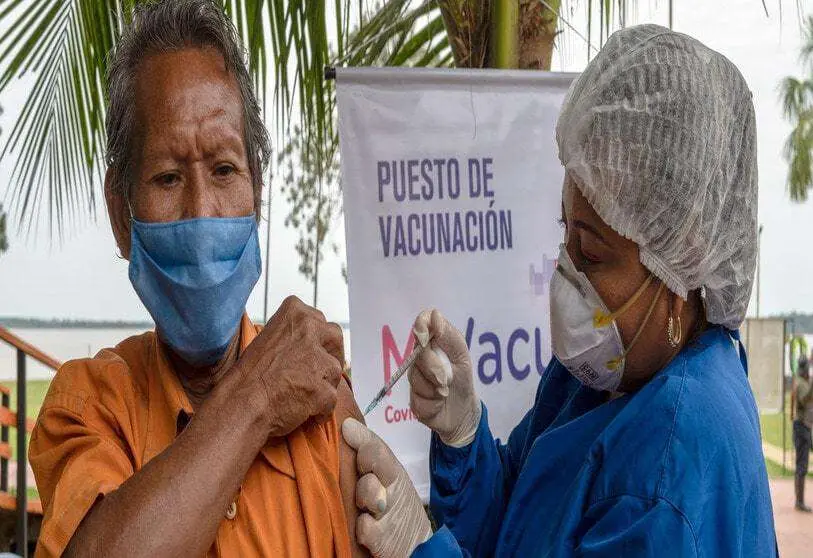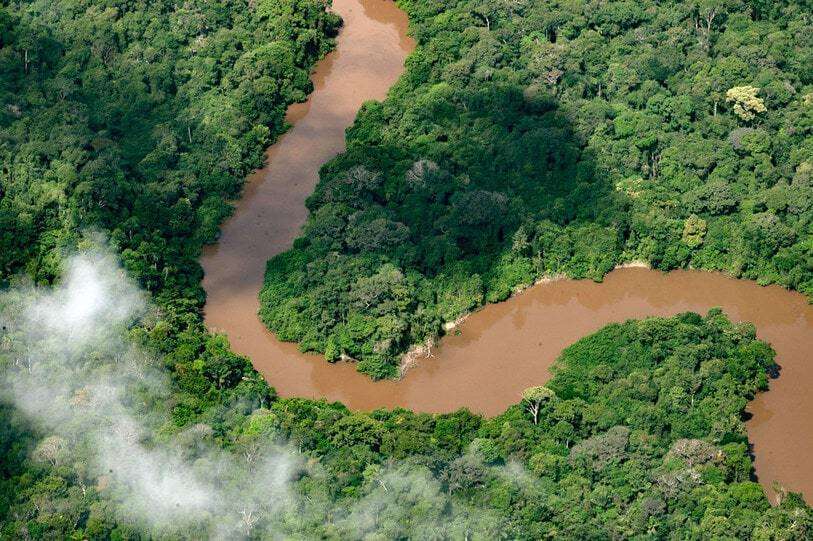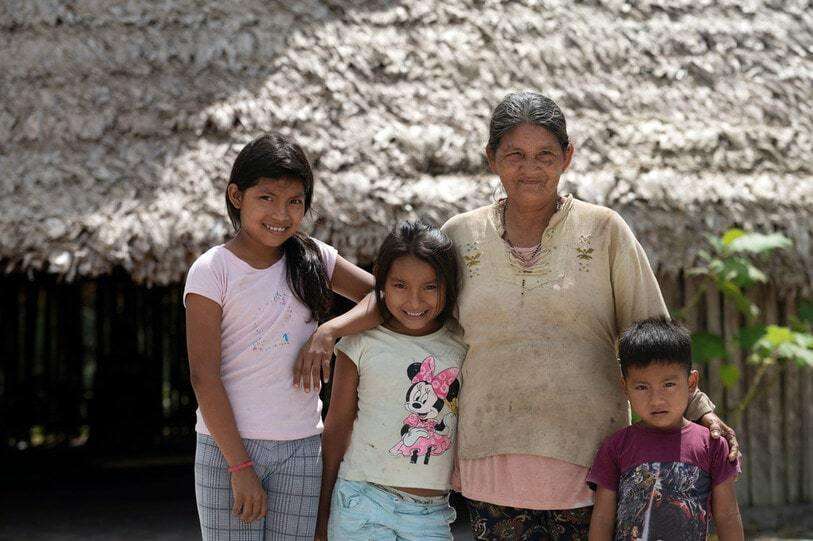COVID-19 vaccination of Amazonian indigenous peoples: one goal, many challenges

Sixteen indigenous Yagua people from the Siete de Agosto community, one of the most remote in the Colombian Amazon territory, raised money to buy 10 gallons of gasoline needed to navigate the Atacuari River to its mouth in the Amazon. Their goal: to reach the municipality of Puerto Nariño in order to make rapid progress in the vaccination process against COVID-19.
Although all sorts of false beliefs circulate in the Amazon jungle, ranging from the vaccine turning them into alligators to the pharmaceutical companies' aim of stealing indigenous DNA, villagers like Teófilo Tatayeri are determined to put their shoulders to the protection. According to traditional Yagua belief, there are demons who sometimes transform themselves into human beings to deceive people in order to do harm, which is why he decided not to believe in these myths.
In May, Teófilo caught the virus and, as he says, "it almost took me to the hole". In order not to repeat this tragedy that put his life at risk, once he heard that vaccinations were being carried out in Puerto Nariño, he did not want to wait for the health brigade to arrive in his community. Without thinking twice, together with family and friends, she decided to embark on a two-hour river crossing to receive this protection against COVID-19.
However, this is not the case in other nine non-municipalised areas of the Colombian Amazon where Ticunas, Uitotos, Muinanes, Ocainas, Yaguas, Cocamas and Boras, among other indigenous peoples, live.

Although the Amazon has seen an improvement in mortality and morbidity indicators for COVID-19 in recent weeks, authorities remain on alert because the pandemic continues to threaten this department, which was once the worst hit by the virus in the country.
At present, misinformation has taken hold and the population, in addition to not adopting the biosecurity recommendations, is afraid to get vaccinated, which puts their survival at risk.
In addition to this complex scenario, the Health Secretariat of Leticia, in the Colombian Amazon, has less than three months to administer the 8550 doses of vaccine received in July, given its capacity to preserve the cold chain network and the safety of the biological component.
In addition, it faces great logistical challenges to cover a territory the size of countries such as Bulgaria or Cuba, with 110,000 square kilometres of tropical rainforest, where 136 communities are located, inhabited mainly by non-Spanish speakers and accessed mainly by long river routes.
On the other hand, entering the territory requires a challenging process of consultation with the indigenous authorities, in which the Colombian government and the local health authority have decided to count on the support of the Pan American Health Organisation, which is materialised through the advice and accompaniment of health professionals, including doctors, epidemiologists, anthropologists, psychologists and a social communicator.

The virus is angry again
In the midst of the summer solstice, La Chorrera is reporting the seventh victim of the pandemic. With the economic recovery and the return of travel to the Amazon, the virus has become 'angry' again, and it is now necessary to build bridges between ancestral knowledge and knowledge based on scientific evidence to prevent the disease and save lives with recommendations that are relevant to the customs, beliefs and language of the population.
This was established in the agreement with the authorities of the four indigenous peoples that inhabit La Chorrera, which allows the Pan American Health Organisation to intervene to increase health services during complex emergencies, strengthen community-based public health surveillance and implement educational actions with an ethnic approach to achieve the prevention of COVID-19, with an emphasis on improving access to and acceptance of vaccination.
A similar consultation process is being carried out in Tarapacá with the Cabildo Indígena Mayor, CIMTAR, and with the Asociación de Autoridades Indígenas de Tarapacá Amazonas, ASOAINTAM.
For the coordinator of the COVID-19 vaccination in Amazonas, Edwin Andrés Velásquez, more than an institutional challenge, this is a personal challenge. During the first wave, as a nurse in the Intermediate Care Unit of the San Rafael Hospital in Leticia, he saw many people die, people he knew and loved, who despite treatment and care lost their battle with life.
"Vaccination for me means living again," says Velasquez, recalling how the immunisation quelled the virus. "After reaching the tragic figure of 251 deaths, since the mass vaccination was carried out in Leticia, only one vaccinated person, with a basic pathology, has lost his life, and days go by without any COVID-19 patients in the Intensive Care Unit. Motivated by this, today I am happy to be able to articulate this process for the non-municipalised areas", says the nurse.
With this same commitment to make the best decisions to save lives, the members of the indigenous organisations are preparing themselves spiritually and emotionally for the consultation. As children of tobacco, coca and sweet yucca, in their malocas, they prepare the mambe and the ambil that they will use during the negotiation and that allows them to discover, enter and recognise the "true word" in moments of crisis, both individual and collective.
In the symbolic universe of the indigenous people of the Amazon, words have life, they can be life-giving, bringing good and development; or they can be false and bring illness, crisis and conflict. This is why concertation must be undertaken without haste and with total rigour so that agreements can be reached on the fundamentals.

The concertation allows each person to enter the territory so that he or she can decide freely and in an informed manner whether to be vaccinated against COVID-19. In addition, the UN agency is committed to advise them in the construction of the components of the Indigenous Own Health Systems, based on the most recent update of the methodological guide, and to provide training in community health strategies.
Back in Leticia, several squads of vaccinators from the Ministry of Health leave in boats for different destinations in the Amazon, on brigades that will last 22 days. They are accompanied by an indigenous translator who will explain what the disease is, what the vaccine is and why it is important to prevent COVID-19 in the indigenous peoples of the Amazon.
"This responds to the methodology proposed by PAHO's office in Colombia, which is based on the ideas of anthropologist Mark Nichter in 2008, who highlighted the importance of knowing the cultural perceptions and social representations of health and disease in indigenous populations, as well as the importance of the dialogue of knowledge for the construction of public health actions," says Dr. Gina Tambini, representative of the UN agency in the South American country.
In the first three weeks, the vaccinators reached the farthest corners of the rainforest with the conviction of saving lives, and bringing the voice of knowledgeable women and midwives who support immunisation, they managed to apply 2825 doses, reaching 33% of the target.
One of those vaccinated is Gabino, the treasurer of the Association of Indigenous Traditional Authorities of Tarapaca in the Amazon, who thanks to the mambe, and his power of understanding, managed to discern the 'sweet words' that come with the promotion of vaccination, and who are motivated to ensure that no one is left behind during the pandemic and that the lives of the indigenous people of the Colombian Amazon can be saved.








